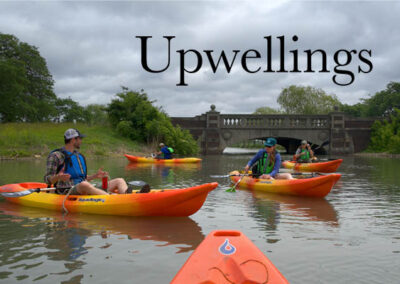
Bay City, MI – Freedom Seekers were environmentalists who learned to navigate the land as they escaped slavery. Songs like “Wade in the Water” and “Follow the Drinking Gourd” remind us that history has always been connected to the land we occupy. The lessons featured in this free curriculum, Freedom Seekers: The Underground Railroad, Great Lakes, and Science Literacy Activities, acknowledge the enslaved Africans who had to rely on environmental science principles in their quest for life, liberty, and the pursuit of happiness. These lessons provide educators with cross-curricular teaching opportunities for middle and high school students.
“I didn’t realize that the Great Lakes were linked to the Underground Railroad at all,” said Megan Gunn, aquatic education specialist with Illinois-Indiana Sea Grant and Purdue University Forestry and Natural Resources. Gunn worked with partners across the region to finalize these resources. “I grew up near Lake Michigan and never learned how my cultural roots were so closely connected to the natural world, so I’m excited for the next generation to have this educational opportunity.”
The Freedom Seekers curriculum project is a collaborative effort between several organizations and schools throughout the Great Lakes. It is part of a professional development effort for educators to increase their knowledge of the Great Lakes and environmental issues while incorporating Environmental Justice Education (EJE) approaches to K-12 teaching. These EJE approaches leverage cross-curricular connections that focus on increasing the awareness of local issues and history in the Great Lakes region. These lessons introduce an innovative way students can engage in place-based learning, by discovering their local history with the Underground Railroad and its connection to the Great Lakes.
“We hope you find this resource to be thoughtful and useful for connecting educational materials on the Underground Railroad, Great Lakes literacy and science teaching,” said Monica Miles, former coastal literacy specialist for New York Sea Grant and the person responsible for dreaming up this project. “These activities are meant to be a launching point for students to continue to engage in robust, well-rounded conversations about the Great Lakes, an area with rich environmental resources and cultural history.”
Connected to the Center for Great Lakes Literacy and its Great Lakes Literacy Principles, these lessons were designed and assembled by the people and organizations listed below as a collaborative effort to share the interconnections humans have with the land. “We are excited to offer this curriculum through the Center for Great Lakes Literacy network,” said Meaghan Gass, MI Sea Grant Extension Educator and CGLL partner. “Using Google Documents, educators can integrate this content into their classroom – either in-person or virtual – this school year. We hope students enjoy learning more about Freedom Seekers and helping to share their story in the Great Lakes basin.”
CONTACT: Meaghan Gass, [email protected], 618-567-4193
Great Lakes connections to Underground Railroad – Black History Month
Free Curriculum for Middle and High School Educators
Learn about Freedom Seekers and the Underground Railroad
View curriculum as a Google Document or PDF
Link to edit and use curriculum
Curriculum Committee:
Buffalo Niagara Waterkeeper – Claudia Rosen
Illinois-Indiana Sea Grant – Megan Gunn
Michigan Sea Grant – Meaghan Gass
New York Sea Grant – Monica Miles, PhD
University at Buffalo /Niagara Falls City Schools – Bhawna Chowdary, PhD
University at Buffalo /N. Falls Underground Railroad Heritage Center – James Ponzo,
PhD
New York State Department of Environmental Conservation – Betsy Ukeritis
The Park School of Buffalo – Kate Haq, PhD
University at Buffalo – Fatama Attie
Wisconsin Sea Grant – Ginny Carlton
Det er næsten umuligt at købe seriøs medicin i USA uden recept. Der er klik op deze link et meget begrænset antal lægemidler, der er frit tilgængelige i staterne. Manglende mulighed for at købe medicin efterlader ofte besøgende og nye indbyggere i USA i en blindgyde.


